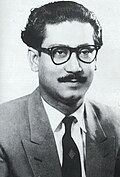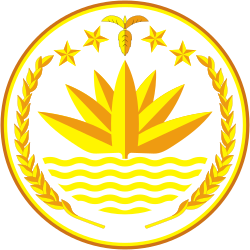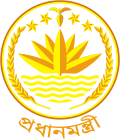No. Portrait Name(Birth–Death) Election Term of office Political party(Coalition) Ministry Took office Left office Time in office Provisional Government of Bangladesh (1971–1972)1 Tajuddin Ahmad তাজউদ্দীন আহমদ (1925–1975 ) — 17 April 1971 12 January 1972 270 days AL Mujib I People's Republic of Bangladesh (1972–present)1st parliamentary republic (1972–1975) 2 Sheikh Mujibur Rahman শেখ মুজিবুর রহমান (1920–1975 )Dhaka-12 , from 1973 — 12 January 1972 25 January 1975 3 years, 13 days AL Mujib II 1973 Mujib III Semi-presidential republic (1975–1991) 3 Muhammad Mansur Ali মুহাম্মদ মনসুর আলী (1917–1975 )Pabna-1 — 25 January 1975 15 August 1975(Deposed in a coup ) 202 days BaKSAL Mujib IV Post abolished (15 August 1975 – 29 June 1978) — Mashiur Rahman মশিউর রহমান (1924–1979)Rangpur-1 — 29 June 1978 12 March 1979 [†] 256 days Jagodal / BNP Zia Post vacant (12 March – 15 April 1979) 4 Shah Azizur Rahman শাহ আজিজুর রহমান (1925–1988)Kushtia-3 1979 15 April 1979 24 March 1982(Deposed in a coup ) 2 years, 343 days BNP Zia Sattar Post abolished (24 March 1982 – 30 March 1984) 5 Ataur Rahman Khan আতাউর রহমান খান (1905–1991)Unelected — 30 March 1984 1 January 1985 [ 3] 277 days Janadal Ershad Post vacant (1 January 1985 – 9 July 1986) 6 Mizanur Rahman Chowdhury মিজানুর রহমান চৌধুরী (1928–2006)Chandpur-4 1986 9 July 1986 27 March 1988 1 year, 262 days JP(E) Ershad 7 Moudud Ahmed মওদুদ আহমেদ (1940–2021)Noakhali-1 1988 27 March 1988 12 August 1989 1 year, 138 days JP(E) 8 Kazi Zafar Ahmed কাজী জাফর আহমেদ (1939–2015)Comilla-12 — 12 August 1989 6 December 1990 [ a] 1 year, 116 days JP(E) Post vacant (6 December 1990 – 20 March 1991) 2nd parliamentary republic (1991–present) 9 Khaleda Zia খালেদা জিয়া (born 1945)Feni-1 1991 20 March 1991 30 March 1996 5 years, 10 days BNP Khaleda I Feb 1996 Khaleda II — Muhammad Habibur Rahman মুহাম্মদ হাবিবুর রহমান (1928–2014) — 30 March 1996 23 June 1996 85 days Independent Habibur 10 Sheikh Hasina শেখ হাসিনা (born 1947)Gopalganj-3 Jun 1996 23 June 1996 15 July 2001 5 years, 22 days AL Hasina I — Latifur Rahman লতিফুর রহমান (1936–2017) — 15 July 2001 10 October 2001 87 days Independent Latifur (9) Khaleda Zia খালেদা জিয়া (born 1945)Bogra-6 2001 10 October 2001 29 October 2006 5 years, 19 days BNP (Four Party Alliance ) Khaleda III — Iajuddin Ahmed ইয়াজউদ্দিন আহম্মেদ (1931–2012) [ b] — 29 October 2006 11 January 2007 74 days Independent Iajuddin — Fazlul Haque ফজলুল হক (1938–2023) — 11 January 2007 12 January 2007 1 day Independent — — Fakhruddin Ahmed ফখরুদ্দীন আহমেদ (born 1940) — 12 January 2007 6 January 2009 1 year, 360 days Independent (with military support ) Fakhruddin (10) Sheikh Hasina শেখ হাসিনা (born 1947)Gopalganj-3 2008 6 January 2009 5 August 2024 [ c] 15 years, 212 days AL (Grand Alliance ) Hasina II 2014 Hasina III 2018 Hasina IV 2024 Hasina V Post vacant (5 – 8 August 2024) — Muhammad Yunus মুহাম্মদ ইউনূস (born 1940) — 8 August 2024 Incumbent 1 year, 142 days Independent Yunus 


























